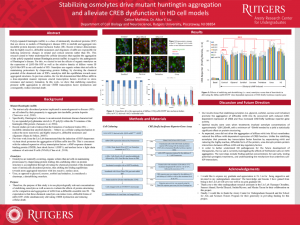Molfetta, Celine: Stabilizing Osmolytes Drive Mutant Huntingtin Aggregation And Alleviate CREB Dysfunction In HD Cell Models
Title: Stabilizing Osmolytes Drive Mutant Huntingtin Aggregation And Alleviate CREB Dysfunction In HD Cell Models
Name: Celine Molfetta
Major: Cell Biology and Neuroscience
School affiliation: School of Arts and Sciences
Programs: Aresty – Research or Conference Funding Recipient
Other contributors: Alice Liu
Abstract: PolyQ-expanded huntingtin (mHtt) is a class of intrinsically disordered proteins (IDP) that are shown in models of Huntington’s disease (HD) to misfold and aggregate into insoluble protein deposits termed inclusion bodies (IB). Recent evidence demonstrates that the highly reactive, diffusible monomers and oligomers of mHtt are responsible for inducing neurotoxic changes in striatal and cortical neurons rather than IBs. This research aimed to better understand the cellular dynamics that regulate the aggregation of the polyQ-expanded mutant Huntingtin protein (mHtt) in regard to the pathogenesis of Huntington’s disease. For this, we elected to test the effects of organic osmolytes on the expression of Q103-Htt-GFP as well as the relative density of diffuse versus IB Q103-Htt-GFP in our cell model of HD. Osmolytes are organic solutes that aid cells in maintaining proteostasis by chaperoning protein folding; by elevating the chemical potential of the denatured state of IDPs, osmolytes shift the equilibrium towards more aggregated structures. In previous studies, the Liu lab demonstrated that diffuse mHtt in a dose-dependent manner represses crucial transcription factors involved in stress resistance and memory formation. In this work, we show that stabilizing osmolytes promote mHtt aggregation to alleviate CREB transcription factor dysfunction and consequently, reduce neuronal death.
